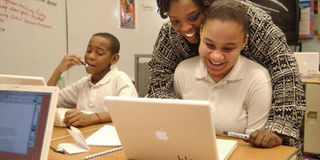Keeping your child safe from pornography

Make sure your children know you’ll be occasionally and randomly checking their browsing history. Internet photo.
What you need to know:
Even if you have parental controls set up on your computer, your children might still be at risk from porn and other adult content on the Internet.
Parents have come to expect, and many times are anxious about, sex talks with their children specifically the more fragile discussion of how to go about a healthy sexual life as a young adult.
There are no rules, and no predictable moment for the conversation. It can happen when the child is 10, and may not understand the basic workings of sex.
Today, this is typically set off by a child’s accidental wanderings online or the deliberate searches by a curious teenager on a computer, laptop, tablet or one of the other devices that have made it nearly impossible to grow up without encountering sexually explicit material.
Let us face it; your child is going to look at pornography at some point. It’s just inevitable. Parents are now faced with a digital-era predicament.
Is it better to try to shield children from explicit content, or to accept that it is so abundant that it has become a fact of life, requiring its own conversation?
The puzzle
With such a variety of information and images found online, the Internet has opened up a new set of topics for parents to discuss with their children. Most parents find it difficult to talk to their children about sex in general, let alone, the harmful effects of pornography.
Yet, it is important to remember that even if your children are not looking for Internet pornography, chances are, they have come across sexual content at some point, and it is the parents’ job to protect and guide them through their questions about sex.
Traditional opinion has held that strict rules about monitoring screen time and use of filtering software will solve the problem. Nevertheless, given the number of screens, large and small, that children come across nowadays, those strategies may be as effective as a drowning man reaching for a straw.
New perspective
Some parents coach their children to click away from explicit material as soon as it pops up, while others try to be as open as possible, filtering content when children are younger and relying on looser controls for teenagers coupled with frank conversations.
There is just no fool-proof plan on a way to protect children from encountering Internet porn? But here are a few suggestions.
Realise that, in all likelihood, you can not completely prevent children from being exposed to pornography unless you cut the “wire” and allow no Internet access at all. But even then, your child may have access to other computers and Internet enables devices outside the home. So, controlling and monitoring your children’s Internet activity is something you can not afford to ignore.
Do not assume, either, that just because you follow one of the methods below you can forget about it. Many children today are tech-savvy, and you should stay vigilant. Consider where and on what devices to allow Internet access.
You may require computers to be used only in the living room or other communal areas of the house where there is no expectation of privacy.
But what about smartphones and tablets? Well, if you are going to allow access on a mobile device like an iPad, make sure you understand all the ways it can access the Internet and consider whether to turn that access off and have Internet in the home accessible on only the communally placed computers.
Use software to control and monitor access. Some programmes, like Family Safety Filter for Windows monitors your child’s computer activity and filters the content they can see on the Internet. It needs to be installed and set up on each computer your children use. To see if you already have the Family Safety Filter installed on your computer, click the Start button, type Windows Live Family Safety in the search box, and see if it appears in the results. If not, you can download and install it from the Microsoft Website for free.
Make sure your children know you will occasionally and randomly check their browsing history and confronting them if you see porn there or, even worse, if you see nothing at all because the browser history has been deleted.
Uganda Communications Commission could take UK’s route of turning off all Internet pornography from “source”, the Internet Service Providers. By default, ISPs are obliged to effect network-level filters restricting access to certain websites.
Users who want to disable the filters then have to take explicit action by specifically opting to turn off the filters, users who obviously have to be adults.
There could also be public campaigns to raising public awareness of the threat of pornography and how it has abounded, thanks to the Internet, in order to empower and equip parents to implement safety measures.
Talk to your children
You are your strongest tool. No technical blocking solution alone is enough to protect a determined child from finding pornography online. Have the “talk” regularly with your children about the content your family finds appropriate and inappropriate. Remember you can not hide your children from the world, but you can train them to safeguard themselves from harmful material within it.




